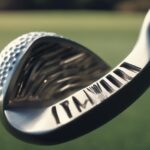- 7 Top Flite Golf Clubs XL for Improved Performance - September 28, 2024
- Top Flite Golf Clubs: Top 5 Reasons to Choose Them - September 28, 2024
- Top 3 Golf Club Fitters for a Perfect Swing - September 28, 2024
When it comes to deburring wheels for golf clubs, the right material makes all the difference. You'll want to choose a wheel that's compatible with your grinder and suitable for the type of metal your clubs are made of. Unitized silicon carbide soft deburring-fine grade wheels are ideal for polishing stainless steel clubs, while porous looking red wheels are perfect for removing scratches. Coarser grits (60-80) are great for heavy material removal, while finer grits (120-220) are better for polishing. Now that you've got a solid start, discover the top picks, budget-friendly options, and high-end deburring wheels that'll take your golf club maintenance to the next level.
Key Takeaways
- Unitized silicon carbide soft deburring-fine grade wheels are ideal for polishing golf clubs, producing a high-luster finish.
- Choose a deburring wheel that fits comfortably on the grinder, considering size, shape, and arbor hole size for optimal performance.
- Select a wheel suitable for the golf club's material, such as stainless steel, aluminum alloy, or carbon steel, for effective deburring and polishing.
- A sequence of grits, from coarse to fine, is typically used to refinish a golf club, achieving a smooth, scratch-free surface.
- Consider the type and speed of the grinder, as well as the desired surface finish, when choosing a deburring wheel for golf club maintenance.
Deburring Wheel Materials Matter
When selecting a deburring wheel for your golf clubs, you'll find that the material used to construct the wheel plays a critical role in achieving a high-quality finish.
The right material can make all the difference in producing a smooth, scratch-free surface. For instance, unitized silicon carbide soft deburring-fine grade wheels are ideal for polishing golf clubs, as they produce a high-luster finish. On the other hand, a porous looking red wheel is perfect for removing scratches, effectively smoothing out the surface.
When it comes to metal deburring wheels, you'll want to ponder options like the Mitchell Golf Metal Deburring Wheel, which is highly recommended for its quality and performance.
The material of the wheel affects not only the finish but also its compatibility with your grinder. This is crucial because you need a wheel that's compatible with your grinder to facilitate efficient and effective deburring.
Choosing the Right Grit Size
When selecting a deburring wheel for your golf club, you'll need to weigh the importance of grit size, as it directly impacts the wheel's aggressiveness and the resulting surface finish.
You'll want to choose a grit size that aligns with your surface finish goals, whether that's removing heavy scratches or achieving a high-polish finish.
Grit Size Considerations
Selecting the right grit size for your deburring wheel is critical, as it directly impacts the level of aggressiveness and the resulting finish on your golf club.
When it comes to golf metal deburring, you'll want to choose a grit size that suits the task at hand. For heavy material removal, coarser grits (60-80) are ideal, while finer grits (120-220) are better suited for polishing and final touches.
You'll typically use a sequence of grits when refinishing a golf club, starting with coarser grits to remove nicks and dings, and progressing to finer grits for a high-quality finish.
The type of material you're working with also plays a role in selecting the right grit size and wheel type. A unitized silicon carbide soft deburring-fine grade wheel, for example, is perfect for polishing, while a porous looking red wheel is better suited for removing scratches and imperfections.
Deburring Wheel Selection
You need to weigh a range of factors when choosing the right deburring wheel for your golf club refinishing project, including the grit size, material, and intended use.
A deburring wheel that's too coarse can leave scratches on your golf club, while one that's too fine may not effectively remove material.
When it comes to selecting the right grit size:
- For removing scratches, use a porous looking red wheel.
- For polishing, use a unitized silicon carbide soft deburring-fine grade wheel.
- For a more precise polish, use a sisal wheel for bulk polishing, followed by polishing wheels for final touches.
Surface Finish Goals
By understanding the surface finish goals of your golf club refinishing project, you can determine the ideal grit size of deburring wheel to achieve a flawless, high-luster finish. The right grit size is vital for removing scratches and imperfections, and selecting a wheel that suits your specific needs is imperative.
| Grit Size | Surface Finish Goal | Recommended Deburring Wheel |
|---|---|---|
| Coarse (60-80) | Remove heavy scratches | Porous looking red wheel |
| Medium (120-150) | Smooth out minor imperfections | Unitized silicon carbide soft deburring-fine grade |
| Fine (220-240) | Achieve high-luster finish | Unitized silicon carbide extra-fine grade |
| Extra-Fine (320-400) | Final polishing for mirror-like finish | Unitized silicon carbide ultra-fine grade |
When deburring, consider the type of metal being refinished, as some wheels are specifically designed for stainless steel, carbon steel, or other materials. By selecting the right grit size and deburring wheel, you can guarantee a surface finish that meets your standards. Remember, the key to a flawless finish is to progressively move from coarse to fine grit sizes, allowing each wheel to do its job before moving on to the next.
Compatibility With Grinder Size

When fitting a deburring wheel to your grinder, verifying the arbor hole size matches your grinder's specifications is crucial to achieve peak performance and avoid damage to the wheel or grinder.
A deburring wheel with a 1/2 arbor hole, for instance, is necessary to fit a standard benchtop polisher grinder for refinishing golf clubs.
Three key considerations to keep in mind when choosing a deburring wheel compatible with your grinder size are:
- Arbor hole size: Confirm the deburring wheel's arbor hole size matches your grinder's specifications to avoid damage or poor performance.
- Wheel size and shape: Select a deburring wheel that fits comfortably on your grinder, taking into account the size and shape of the wheel.
- Grinder type and speed: Consider the type and speed of your grinder when choosing a deburring wheel, as some wheels are designed for specific grinder types or speeds.
Metal Type Considerations
When you're selecting a deburring wheel for your golf clubs, you'll need to think about the metal type, as different wheels are optimized for specific metals.
You'll want to choose a wheel that's designed for your club's material, whether it's stainless steel, aluminum alloy, or carbon steel.
Stainless Steel Options
Refinishing stainless steel golf clubs demands a deburring wheel that won't scratch or mar the surface, making stainless steel options a top priority. You'll want a wheel that can effectively polish the club's surface without leaving any marks.
When it comes to stainless steel deburring wheels, you have several options to examine:
Unitized silicon carbide soft deburring-fine grade wheels: These wheels are suitable for polishing stainless steel golf clubs and provide a high-quality finish.
The Mitchell Golf Metal Deburring Wheel: This metal wheel is a popular choice for deburring and polishing stainless steel golf clubs, weighing 0.6 lbs and measuring 6 x 6 x 1 in.
Porous looking red wheels: These wheels are also effective in removing scratches from stainless steel golf clubs during the refinishing process.
When selecting a deburring wheel for stainless steel golf clubs, verify the wheel's material, weight, and dimensions to guarantee it fits your grinder and meets your polishing needs. By picking the right wheel, you'll be able to achieve a high-quality finish that will make your clubs look like new, perfect for club restoration.
Aluminum Alloy Choices
Aluminum alloy deburring wheels offer a softer, more flexible material that's ideal for gently removing scratches and imperfections from golf clubs.
This is due to the unique alloy properties that provide a porous, open structure, making them perfect for refining surfaces without causing damage.
In material science, aluminum alloys are known for their high ductility, allowing them to conform to the club's shape and remove imperfections without scratching the surface.
When compared to other materials, aluminum alloy deburring wheels offer a cost-effective solution for golf club refinishing. They're also less aggressive than other options, making them suitable for delicate club heads.
Additionally, their softness reduces the risk of over-polishing, guaranteeing a high-quality finish.
When selecting an aluminum alloy deburring wheel, consider the arbor size compatibility with your benchtop polisher grinder to facilitate safe and effective operation.
Carbon Steel Benefits
Carbon steel deburring wheels, with their dense, compact structure, provide a more aggressive abrasive action that's particularly effective at removing stubborn imperfections and heavy scratches from golf clubs. This makes them an excellent choice for golfers who demand the highest level of precision and quality in their clubs.
When considering carbon steel deburring wheels, you'll appreciate the following benefits:
Cost effectiveness: Carbon steel deburring wheels offer a cost-effective solution for golf club maintenance, allowing you to achieve professional-level results without breaking the bank.
Rust resistance: Carbon steel's natural rust resistance guarantees that your deburring wheel will withstand the rigors of regular use, even in humid or wet environments.
High hardness: Carbon steel's high hardness rating means that it can withstand the wear and tear of deburring, maintaining its effectiveness over time.
Top Picks for Stainless Steel
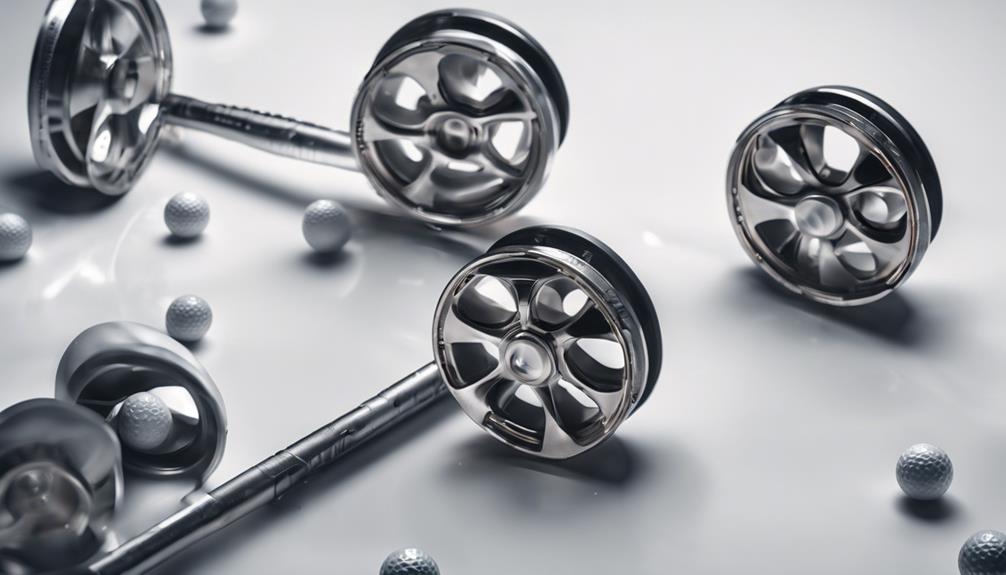
When deburring and polishing stainless steel golf clubs, a porous looking red wheel is your go-to solution for removing scratches.
For top-notch results, consider the Mitchell Golf Metal Deburring Wheel, a top pick for its exceptional deburring and polishing capabilities. Alternatively, unitized silicon carbide soft deburring-fine grade wheels are also suitable for polishing stainless steel golf clubs.
Additionally, the NUODUN Abrasive Polishing Scouring Resistant wheels and uxcell Drill Scrubber Scouring Cleaning wheels are recommended for stainless steel golf club refinishing.
To maintain proper club maintenance, investing in a benchtop polisher grinder with 1/2 arbor holes, specifically designed for using deburring and polishing wheels on stainless steel golf clubs, is crucial.
This setup will allow you to effectively remove scratches and imperfections, ultimately enhancing the overall steel quality and golf aesthetics of your clubs.
With the right tools and techniques, you'll be able to restore your stainless steel golf clubs to their original condition, guaranteeing peak performance and visual appeal.
Best for Forged Iron Clubs
When working with forged iron clubs, you'll want to prioritize three key aspects: iron clubhead deburring, smooth face finish, and precise edge removal.
To achieve these goals, you'll need to select the right deburring wheel for the job, taking into account the wheel's material, size, and grade.
Iron Clubhead Deburring
To achieve a smooth, scratch-free surface on your forged iron clubs, you'll want to reach for a porous-looking red wheel specifically designed for removing scratches from iron clubheads. This type of wheel is perfect for deburring iron clubheads, resulting in a flawless finish that won't hinder your swing performance.
When it comes to iron clubhead deburring, it's vital to use the right tools and techniques to avoid damaging your golf club.
- Select the right wheel: Pick a wheel that's designed for deburring iron clubheads, such as a Mitchell Golf Metal Deburring Wheel. This will guarantee you get the desired results without damaging your club.
- Use a benchtop polisher grinder: A grinder with 1/2 arbor holes is ideal for deburring iron clubheads. Don't forget to wear protective gloves and eye-wear for safety.
- Polish after deburring: Once you've removed scratches and imperfections, use a unitized silicon carbide soft deburring-fine grade wheel to polish the clubhead, providing a high-quality finish.
Smooth Face Finish
Achieving a smooth face finish on your forged iron clubs requires a meticulous polishing process that starts with the right tools, including a unitized silicon carbide soft deburring-fine grade wheel designed specifically for this purpose.
This wheel is ideal for removing minor scratches and imperfections, providing a smooth surface for further refinishing.
When using a deburring wheel, wear protective gloves and eye-wear to prevent injury from flying debris, as safety precautions are vital.
A benchtop polisher grinder with 1/2 arbor holes is necessary to fit the deburring and polishing wheels, ensuring a secure and efficient polishing process.
To achieve a high-quality smooth face finish, you'll need to follow a multi-stage polishing process, using progressively finer grits and polishing compounds to remove imperfections and scratches.
This attention to detail will result in exceptional face protection, finish quality, and club aesthetics.
Precise Edge Removal
By utilizing a unitized silicon carbide soft deburring-fine grade wheel, you can effectively remove minor imperfections and precisely refine the edges of your forged iron clubs.
This is vital for maintaining peak Club Head Geometry and Edge Profile Analysis, which directly impact your game's performance.
When it comes to precise edge removal, employing techniques that preserve sharpness is necessary to prevent dulling and guarantee a consistent swing.
Wheel selection: A unitized silicon carbide soft deburring-fine grade wheel is ideal for polishing and deburring forged iron clubs.
Safety first: Always wear protective gloves and eye-wear when using a deburring wheel to prevent injury.
Equipment setup: Verify that your benchtop polisher grinder has 1/2 arbor holes to accommodate deburring and polishing wheels during the refinishing process.
Deburring Wheels for Chrome Plated
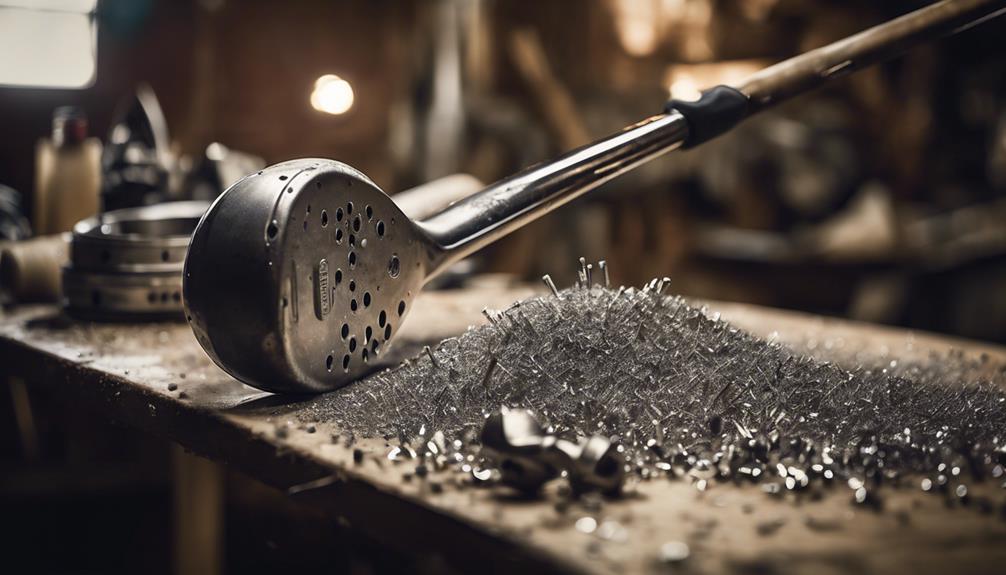
When deburring chrome plated golf clubs, you'll want to reach for a porous looking red wheel, which is specifically designed to remove scratches and leave a smooth finish.
This wheel design is ideal for maintaining the chrome finish on plated surfaces.
The Mitchell Golf Metal Deburring Wheel is a popular choice among golfers for deburring and polishing chrome plated golf clubs.
Alternatively, unitized silicon carbide soft deburring-fine grade wheels are also suitable for polishing chrome plated golf clubs after deburring.
When choosing a deburring wheel for chrome plated golf clubs, you'll want to verify that it fits the grinder size and is compatible with the polishing compounds used.
You'll want to make certain the wheel is designed for use on chrome plated surfaces to avoid damaging the finish.
NUODUN Abrasive Polishing Scouring Resistant wheels and uxcell Drill Scrubber Scouring Cleaning wheels are other options to look into for deburring and polishing chrome plated golf clubs.
Most Popular Among Golfers
Among golfers, the most sought-after deburring wheels for golf clubs are those that effectively remove scratches and leave a smooth finish, with a porous looking red wheel being a top favorite. You're not alone in your quest for the perfect deburring wheel, and bear in mind the preferences of fellow golfers who've had personal experiences with these products.
When it comes to club maintenance, you want a deburring wheel that gets the job done efficiently.
- Mitchell Golf Metal Deburring Wheel: A highly recommended option for deburring and polishing golf clubs.
- Unitized silicon carbide soft deburring-fine grade wheels: Suitable for polishing golf clubs and leaving a smooth finish.
- NUODUN Abrasive Polishing Scouring Resistant wheels and uxcell Drill Scrubber Scouring Cleaning wheels: These wheels are also popular among golfers for their effectiveness in removing scratches and leaving a smooth finish.
Budget-Friendly Deburring Options
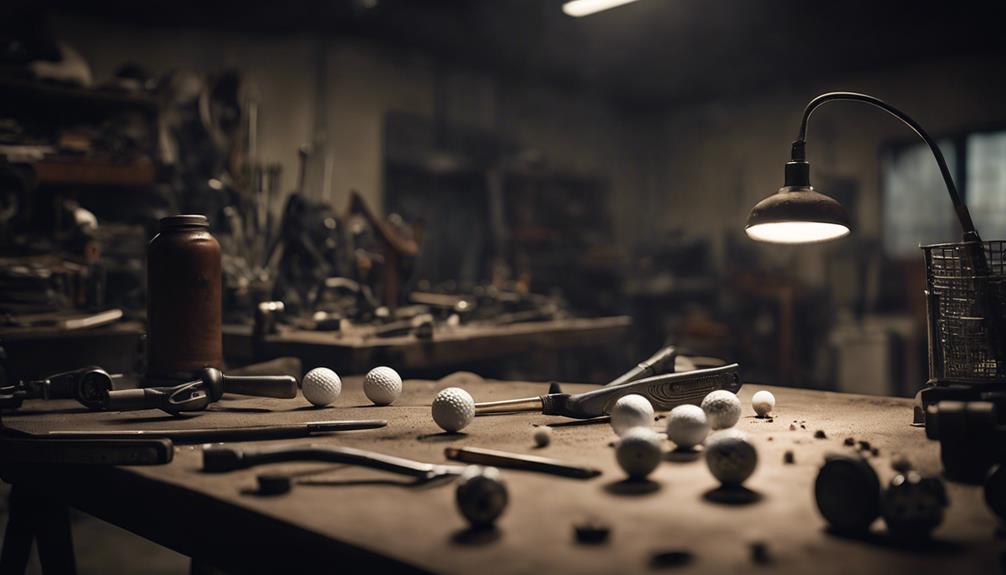
You can achieve professional-grade deburring results without breaking the bank by exploring budget-friendly options that deliver exceptional performance. As a DIY enthusiast, you can take advantage of cost savings and enjoy the satisfaction of restoring your golf clubs to their former glory.
When it comes to budget-friendly deburring options, there are several choices available. Here are a few recommendations:
| Deburring Wheel | Description |
|---|---|
| Mitchell Golf Metal Deburring Wheel | A budget-friendly option for deburring golf clubs, recommended by sailfishchris |
| Unitized silicon carbide soft deburring-fine grade wheel | Ideal for polishing golf clubs, offering a cost-effective solution |
| NUODUN Abrasive Polishing Scouring Resistant wheel | A popular choice for deburring and polishing golf clubs, known for its effectiveness |
| uxcell Drill Scrubber Scouring Cleaning wheel | A DIY favorite for restoring golf clubs, offering excellent value for money |
High-End Deburring Wheels Reviewed
For those seeking premium deburring results, high-end deburring wheels offer unparalleled performance and precision, making them an attractive option for golf enthusiasts looking to restore their clubs to pristine condition.
These luxury wheels are crafted with expensive materials, providing a high-quality finish and a luxury feel that justifies their premium price tag.
When you invest in a high-end deburring wheel, you have high expectations for its performance, and these wheels deliver.
Three top-rated high-end deburring wheels worth exploring are:
Mitchell Golf Metal Deburring Wheel: This 0.6 lbs wheel boasts dimensions of 6 x 6 x 1 in and features a Unitized silicon carbide soft deburring-fine grade wheel ideal for polishing.
NUODUN Abrasive Polishing Scouring Resistant wheel: This wheel is designed for heavy-duty deburring and polishing tasks, making it a great option for those seeking a high-end solution.
uxcell Drill Scrubber Scouring Cleaning wheel: This wheel offers a precise and controlled deburring experience, making it perfect for golf enthusiasts who demand the best results.
With these high-end deburring wheels, you can expect exceptional results and a luxury feel that will make your golf clubs look and feel like new.
Deburring Wheel Durability Compared
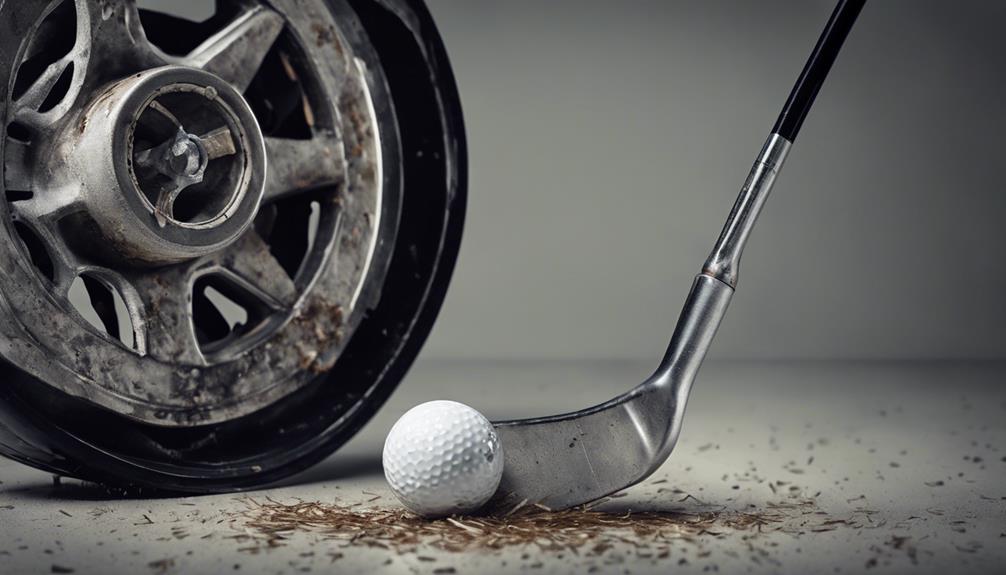
When evaluating deburring wheels for golf clubs, their durability becomes a vital factor, as it directly impacts their lifespan and overall performance.
You need a wheel that can withstand the rigors of frequent use and maintain its effectiveness over time.
To gauge a wheel's durability, you should look into its material composition and construction. Wheels made from high-quality materials, such as silicon carbide, tend to outlast those made from inferior materials.
Durability tests, such as wear and tear simulations, can also provide valuable insights into a wheel's longevity.
When it comes to wheel longevity, material science plays a key role. A wheel's ability to resist abrasion, corrosion, and heat damage determines its overall durability.
By choosing a wheel that excels in these areas, you can confirm it remains effective and efficient throughout its lifespan.
Ease of Use and Maintenance
Selecting a deburring wheel that's easy to use and maintain can substantially reduce the time and effort spent on golf club maintenance, allowing you to focus on perfecting your game.
When choosing a deburring wheel, consider the user experience and tool ergonomics to guarantee a comfortable and efficient maintenance process. For instance, a porous looking red wheel is recommended for removing scratches and is easy to use for deburring golf clubs.
To facilitate ease of use and maintenance, follow these essential tips:
Regular Cleaning: Clean your deburring wheel regularly to prevent debris buildup and maintain its effectiveness.
Proper Storage: Store your deburring wheel in a dry place, away from direct sunlight, to prevent damage and extend its lifespan.
Personal Protective Equipment: Always wear protective gloves and eye-wear when using a deburring wheel to promote safe and easy maintenance.
Frequently Asked Questions
What Is a Convolute Wheel?
You're likely familiar with deburring wheels, but what is a convolute wheel? It's a unique wheel design featuring a convoluted surface pattern, offering aggressive material removal and a smooth finish, with various material options, requiring regular wheel maintenance for peak performance.
How Do You Use a Deburring Wheel?
As you venture on the refining journey, you'll need to wield the deburring wheel with precision, employing proper technique, regular wheel maintenance, and stringent safety precautions to attain a flawless finish, safeguarding your hands and eyes from the whirring storm.
Conclusion
You've got the perfect golf swing, but imperfect clubs can ruin your game.
Deburring wheels are the unsung heroes that refine your clubs' performance.
You've weighed materials, grit sizes, and compatibility; considered metal types, budgets, and durability.
Now, you're equipped to make an informed choice.
Like a well-balanced club, your deburring wheel should be a precise fit.
With the right wheel, your clubs will shine, and so will your game.




